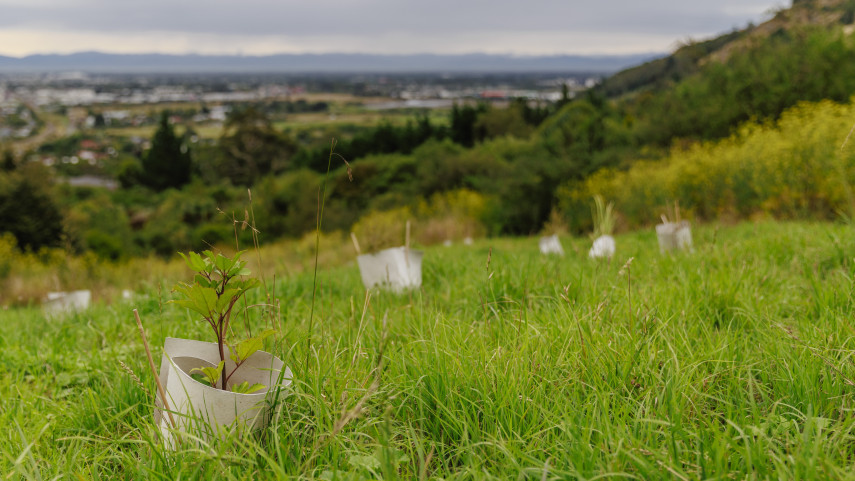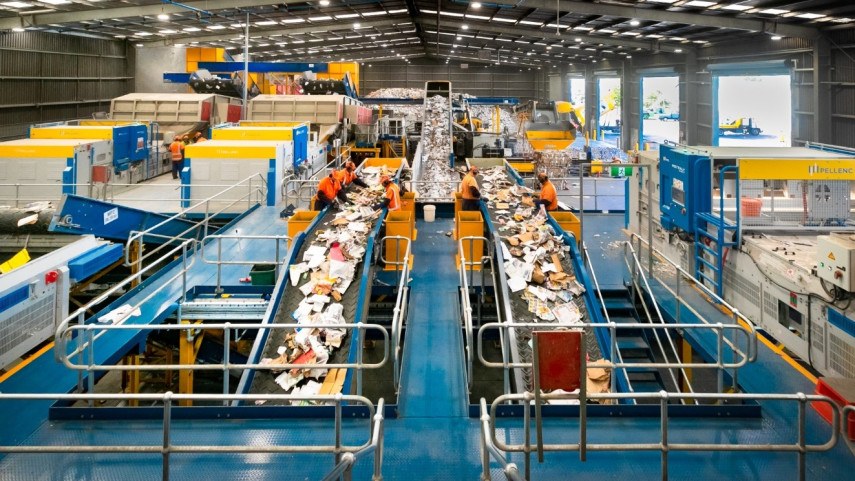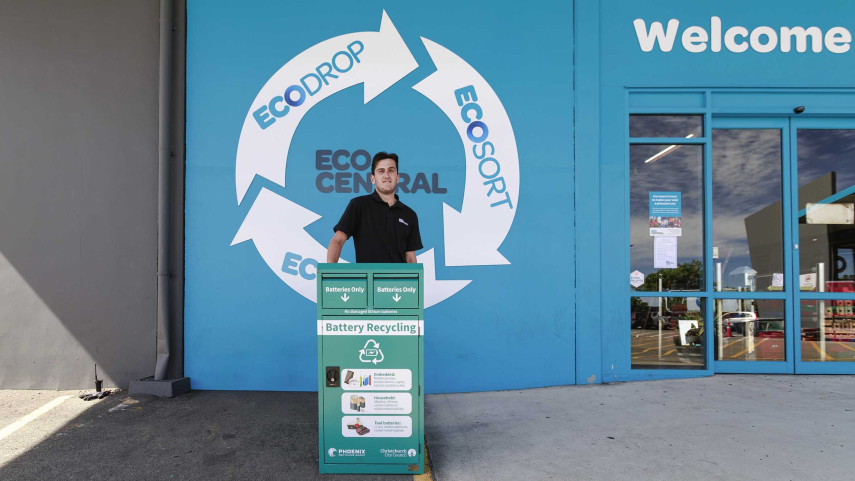The Waste Minimisation Act 2008 places responsibility on local government (territorial authorities) to promote effective and efficient waste management and minimisation within their districts.
Applications open on 1 May 2026 and close on 31 May 2026
The Canterbury Waste Joint Committee is responsible for advancing regional solid waste and hazardous waste minimisation in Canterbury. Regional waste minimisation initiatives actioned by the Committee are in addition to member Councils' responsibilities as required by the Waste Minimisation Act 2008, and as set out in each Councils' respective waste minimisation plan.
For projects that have a local application only, please see your council for available funding. The following Councils are represented on the Committee. For more information on this regional fund, please contact your council and ask to speak to a waste staff member.
- Ashburton District Council(external link)
- Christchurch City Council
- Hurunui District Council(external link)
- Kaikoura District Council(external link)
- MacKenzie District Council(external link)
- Selwyn District Council(external link)
- Timaru District Council(external link)
- Waimakariri District Council(external link)
- Waimate District Council(external link)
- Environment Canterbury(external link)
Environment Canterbury staff provide ongoing advice relating to minimising hazardous wastes and substances.
The Committee's Constituting Agreement [PDF, 23 KB] and Regional Waste Agreement [PDF, 7 KB] govern its operations. Decisions on grants are made by the elected members of the member Councils meeting as the Canterbury Waste Joint Committee, based on written Staff Group reports.
Projects supported by the Committee aim to link strategically with initiatives run by national organisations including WasteMINZ, Local Government NZ and the Ministry for the Environment. Government procurement can and should be used to support wider social, economic, cultural and environmental outcomes.
Contact details
Email questions and applications to cwjc@ccc.govt.nz.
The Committee annually invites proposals for suitable waste minimisation project proposals within the Canterbury region.
Proposals assessed to be of sufficient potential value and meeting the criteria set out below will be presented to the Committee. The total annual budget for all projects is $126,000.
- Project scope: Only waste minimisation projects with broad regional application in Canterbury will be considered. Local projects may be accepted only if they show strong potential to be expanded or replicated across other parts of the Canterbury region.
- Funding limit: Individual grants will be limited to no more than $50,000 (excluding internal staff time).
- Co-funding: Co-funding from other sources of a minimum of 40% of total project costs will be preferred. Where possible, projects should demonstrate cross-sector support and/or participation and/or ongoing viability.
- Applicant requirement: The applicant must be a legal entity.
- Contribute towards one or more of: Waste avoidance; Reduction of waste to landfill; Recovery of resources.
- Demonstrated ability by the applicant to deliver the project and relevant track record of applicant.
- Clearly identified measurability of outcomes.
- Circular economy principles should be considered, where relevant (e.g. the whole lifecycle of a product is accounted for).
- Projects fostering innovation are preferred.
- Details of self-funding and co-funding contributions for the proposed project must be provided.
- Online applications(external link) must be received by no later than 31 May 2026.
- In June, the Committee's Staff Group will assess applications to shortlist proposals. The Staff Group may request additional information or clarification.
- The Staff Group will submit all applications received and evaluated to the Committee, plus a shortlist of proposed projects for consideration by the Committee.
- In August, the Committee will consider and select successful projects. Successful and unsuccessful applicants will be notified by email of the outcome shortly thereafter.
- The Packaging Forum grants(external link)
- Waste Minimisation Fund(external link)
- Sustainability Fund(external link)
- Live out of Christchurch? Check your local Council's website for other grants in your area.
| Project | Year | Applicant | Description | Funding |
|---|---|---|---|---|
| Trash to Treasure | 2025 | Climate Action Campus Ōtautahi/Ao Tawhiti Unlimited Discovery | Diverts reusable construction and homeware materials from landfill to schools and communities across Canterbury. The site will be upgraded with the addition of a shelter to protect materials and ensure they remain in good condition for reuse. | $7,850.00 |
| Reduce, Reduce! | 2025 | Little River School | Hungry Bins to turn food scraps into vermicast for the school’s vegetable garden. Reduces waste and teaches students how organic recycling supports growth and sustainability. | $1,282.00 |
| Scaling Impact through Sustainable Food Rescue and Recovery | 2025 | Kairos Food Rescue | Expands food recovery operations to reduce edible food waste to landfill, promote circular economy outcomes, and increase capacity through fleet upgrades and technology improvements. | $20,000.00 |
| Reducing and Repurposing 3D Printer Waste | 2025 | University of Canterbury | Develops a lab programme to reduce and repurpose 3D printing waste, audit regional sources, and embed sustainable practices in engineering education while fostering innovation and reducing landfill impact. | $27,532.00 |
| Sustainable Comfort: Reusable Solutions for Aged Care | 2025 | Waste-Ed With Kate Limited | Delivers education and support to 10 Canterbury retirement villages to reduce single-use incontinence waste through workshops, product trials, and ongoing guidance, promoting reusable solutions and sustainability awareness. | $43,000.00 |
| Fabric Recycling | 2025 | TwinNeedle Limited | Trials recycling nylon fabric offcuts by sending them to Impact Tec Textile Recycling to be transformed into recycled rigid panels, reducing textile waste. | $4,836.00 |
| Spout Milk on Tap - Canterbury - Reusable Kegs and Pump System | 2025 | Spout Alternatives Limited | Introduces an electric pump tap system for hospitality outlets to dispense milk from reusable kegs without nitrogen cylinders, improving efficiency, reducing milk waste, and cutting single-use plastic bottle waste. | $12,000.00 |
| Ao Tawhiti Unlimited Discovery – Climate Action Campus |
2024 | Climate Action Campus Trash 2 Treasure |
This initiative diverts clean Batts offcuts and construction waste to community groups and the public, using a staffed collection site at the Climate Action Campus to reduce landfill waste and emissions. | $5,000 |
| Repurposing redundant truck curtains |
2024 | Naylor Love Canterbury | Repurposing redundant truck curtains into timber pack covers. | $10,000 |
| Subcontractor waste awareness sessions |
2024 | Naylor Love Canterbury | This project raises awareness among Construction subcontractors regarding the industry's landfill impact, promotes sustainability initiatives, and collects data to measure progress in construction waste reduction. | $3,000 |
| Timber Diversion | 2024 | Halswell Menzshed Trust | Collect timber, including pallets and packaging, for reuse in community projects. | $5,000 |
| Laptop Repair Workshops | 2024 | Digital Future Aotearoa | Divert laptops from waste, refurbishes them for young people in need, teaches repair skills, and promotes e-waste reduction, sustainable consumption, and digital equity. | $20,000 |
| Developing corporate and construction resource recovery system |
2024 | All Heart NZ Charitable Trus |
Improving corporate sustainability by diverting resources from landfills in the Canterbury region by developing people through All Heart Stores. | $25,000 |
| Waste Free Period Programme |
2024 | Waste-Ed with Kate Ltd | The programme educates students and staff of 22 secondary schools in Canterbury on reusable product options and provides free reusable products for participants to encourage long-term waste reduction habits. | $30,000 |
| Rewashable service ware systems establishment |
2024 | Without Waste Ltd | This project trials reusable cup systems at events to reduce packaging waste and bin misuse and contamination. | $14,000 |
| Sustainable Pest Monitoring Cards Research | 2023 | Lincoln University | Development of wood pulp chew/bite mark analysis cards to replace the plastic coreflute cards used in public spaces, such as parks, throughout NZ for pest monitoring programmes. |
$15,000 |
| All Heart NZ- South Island First Hub | 2023 | All Heart NZ | Pickup and reuse of bulk quantities of difficult-to-rehome office/school and business-type fitout items which are frequently landfilled due to a lack of alternatives. |
$26,500 |
| Recycle a Device - RAD | 2023 | Digital Future Aotearoa (Recycle a Device) | Free laptop repair workshops with a focus on rural communities in Canterbury, rehoming laptops and e-devices to community support organisations for distribution to those in need. | $20,000 |
| Textile Waste Reduction and Education | 2023 | Walk LIGHTLY | Connecting offcut and redundant stock textiles with the garment industry throughout Canterbury and providing education around textile waste in NZ. | $10,000 |
| North Canterbury Waste Minimisation Hub | 2023 | Kaiapoi Community Hub Trust (Satisfy Food Rescue) | Contribution towards a Waste Minimisation Hub for North Canterbury to run food rescue activities and waste reduction workshops, repair cafes, etc. | $20,000 |
| Te Ao Māori Zero Waste Education | 2023 | Para Kore Marae Incorporated | Te Ao Māori zero waste education through targeted workshops to Marae, Kura and general community organisations, including setting up proven systems to drop waste volumes produced onsite. | $10,500 |
| Community Carpentry and Waste Education | 2023 | Cook Brothers Construction | Free community workshops to teach carpentry and repair skills, and use of construction project offcuts to make furniture for community spaces, and provide education around waste in the construction and demolition industry in NZ. |
$10,000 |
| Event Waste Reduction Planning | 2022 | A and P Show(external link) | Waste reduction feasibility study for a large event that can be shared with other large agricultural events. | $10,000 |
| Repair Café project | 2022 | Te Puna Auaha Lyttelton Trust Board(external link) | Items to set up a repair café for the community to have assistance fixing broken items. | $15,600 |
| Second-hand bike repairs | 2022 | Rad bikes(external link) | Recycling and repairing bikes using second-hand parts. | $16,500 |
| Repair and reuse of medical items | 2022 | Medsalv(external link) | Repair and certified sanitisation of single-use medical devices for safe reuse. | $14,999 |
| PVC pipe recycling | 2022 | Rx Plastics(external link) | Project to allow for PVC pipes to be recycled rather than landfilled. | $16,200 |
| Food waste reduction app | 2022 | Foodprint(external link) | App for cafes and the public to connect to reduce waste of highly perishable and difficult-to-donate food goods. | $42,200 |
| School lunches waste reduction | 2022 | Waipara School(external link) | Provision of a system to reduce single-use packaging and food waste. | $2,500 |
| School lunches waste reduction | 2022 | Leithfield School(external link) | Provision of a system to reduce single-use packaging and food waste. | $4,000 |
| Bike repair skills | 2021 | Waimakariri District Council(external link) | Support for employment and skills taught in bike repairs on second hand bikes and parts. | $10,000 |
| Case Study for Linen Use Reduction | 2021 | Canterbury Linen Services(external link) | Investigation into the reduction of fabrics going to landfill. | $21,000 |
| School Food Waste Reduction Project | 2021 | Nourish Oraka Ltd(external link) | Food Waste Reduction – Durable Lunch Boxes. | $3,186 |
| Workshops to Reduce Textile Waste | 2021 | Stitch O Mat | Community workshops to provide sewing machines and lessons to teach repair skills reducing clothing disposed of. | $6,000 |
| School Reusable Lunch and Food Scrap Containers | 2021 | Kai for Kids(external link) | Education to students parents and teachers on the reduction of waste from school lunches. | $979 |
| Food Rescue Project | 2021 | Satisfy Food Rescue(external link) | Chilled container hire to store rescued food to take to community organisations for distribution. | $12,454 |
| Waste Free Periods Education | 2021 | Timaru District Council(external link) | Education provided to school students on reusable sanitary products. | $30,842 |
Related news

Restoration of red-zoned Port Hills properties gets underway
A 10-year programme to revegetate red-zoned properties in the Port Hills aims to transform the area and restore its unique biodiversity.
11 Feb 2026
Gold stars for bin good
Christchurch residents are earning top marks for their best year yet at recycling.
18 Dec 2025
New fire-resistant units for recycling household batteries safely
Christchurch residents have new options for safely disposing of household batteries with upgraded, fire resistant collection units.
16 Dec 2025